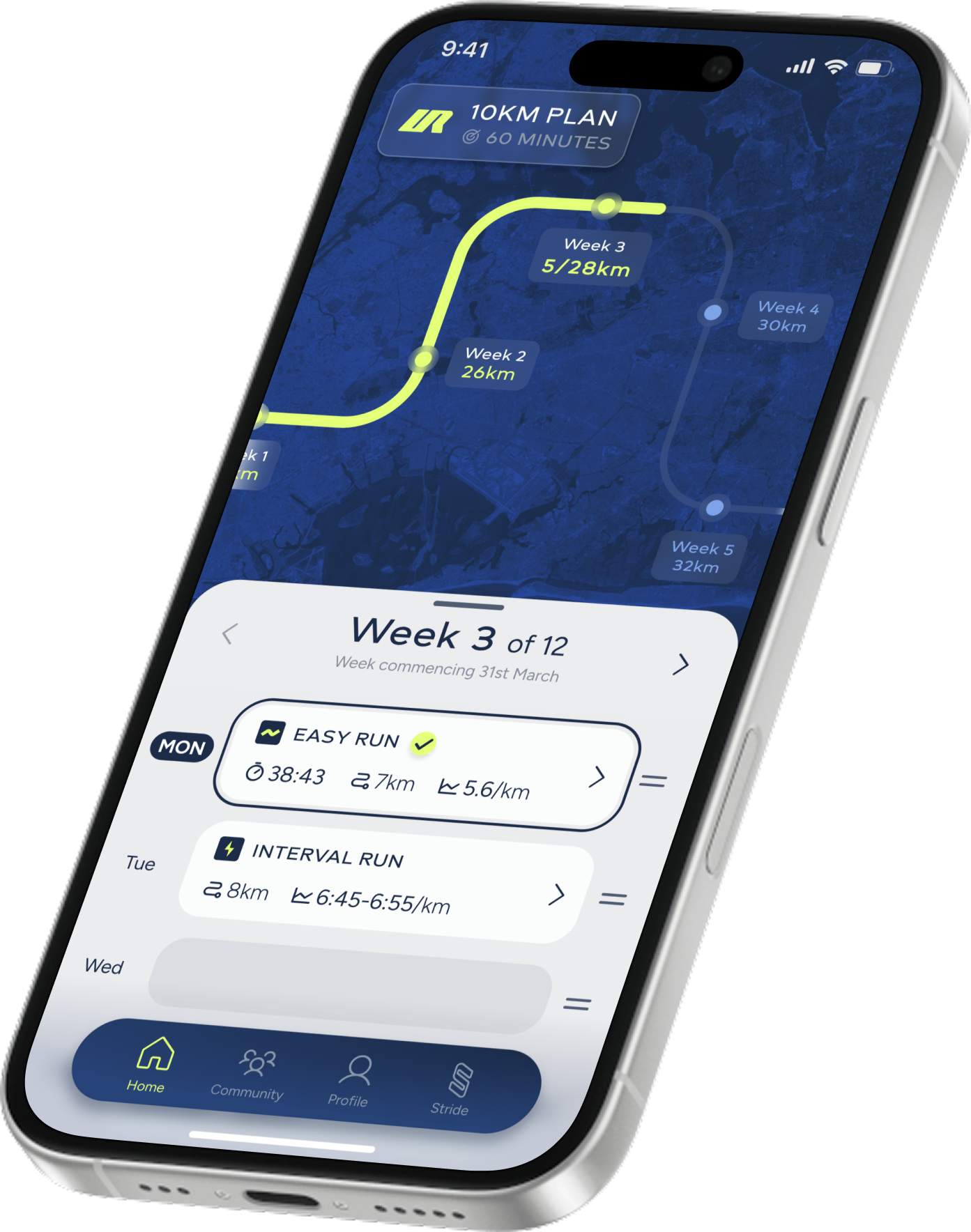7 ways running reduces stress
A bit of stress is good. Too much is bad.
Sadly, most of us fall into the second camp. And, really, it’s no wonder. Navigating today’s world can be, well, overwhelming at times (and that’s putting it lightly).
Whether it’s work demands, social pressures, the climate crisis, the cost of living, global unrest – the list could go on – there’s so much competing for our attention and energy.
The problem? Chronic stress puts our bodies into constant ‘fight-or-flight’, sending our delicate nervous system (which relies on balance) into a frazzled, frenetic overdrive.
Our sleep worsens. Our mood dips. Our digestion suffers. Our weight increases. Our hormones fluctuate. Our skin breaks out.
In short, chronic stress takes a toll on every single part of us.
But here’s the good news: your training can serve as a great antidote. And for International Stress Awareness Day (5th November), here are 7 ways running reduces stress.
It reduces stress hormones
From a neurochemical perspective, running is a simple and effective tool to release any pent-up tension and anxiety. That’s because it lowers excess cortisol and adrenaline – the body’s primary stress hormones.
Running doesn’t just ‘burn off’ these guys; it actually helps you handle future stress better.
You see, training is a form of stress on the body (but the good kind – and the right amount).
This phenomenon is known as ‘hormesis’ – a physiological response where small, physical challenges (an interval run, for instance) can help you adapt, get stronger, and become more resilient (1).
It’s a bit like the saying, “What doesn’t kill you, makes you stronger”. Essentially, it improves your ability to deal with stress in general – one of the key mental health benefits of running.
It boosts those feel-good chemicals
Ever felt like you’ve grown wings when you’re out running?
That’s all thanks to that famous ‘Runner’s High’.
Running releases a cocktail of ‘happy hormones’ – the likes of endocannabinoids (a recent discovery), endorphins (natural painkillers), dopamine, and serotonin – that lift you and offset the effects of stress (2).
It’s a perfect example of how exercise improves mood and supports emotional balance long after your run is done.
Some runners can experience this tantalising, euphoric feeling a few minutes into their run; for others, it may take a little longer. Ultimately, just hitting the pavement is an easy win for your well-being.
It improves sleep
Sleep is a form of ‘overnight therapy’ that helps you balance emotions, process experiences, and reset your brain.
That’s why a lack of rest can fuel stress.
And, frustratingly, poor sleep and stress often exist in a vicious cycle.
The less sleep you get, the more anxious you feel the next day – and the less likely you are to sleep well the following night.
Running (and any form of movement, really) can break this cycle.
Training can help you fall asleep faster (think about that bone-weary feeling you get a few hours after running) and makes it easier to reach deeper, more restful stages of sleep (3). The result? You’ll feel better equipped to deal with any stress the following day.
Tip: When it comes to sleep, timing matters. Some people can train intensely right before bed and sleep fine; others find it keeps them awake. Just pay attention to what works best for your body.
It gets you outside
Unless you’re on the treadmill (which, of course, has its place in any training programme), running is an al fresco activity.
And that means the chances of running in nature are pretty high. Studies show that being in green spaces can reduce stress levels even more (4). This is down to ‘fractals’ – calming, infinite patterns that occur naturally in clouds, leaves, trees, and water.
Better yet, moving in a green space oxygenates your blood more efficiently (thank you, trees). Breathing in fresh air increases blood circulation, energy levels, and brain function.
Even if you can’t access nature, simply being outside means getting more sun exposure, which helps regulate your circadian rhythm (think better sleep!) and boosts vitamin D levels (think improved mood!).
It’s mindful
Running forces you to be present. It creates space between you and your worries – a bit like a ‘moving meditation’.
When you’re focusing on climbing the hill in front of you, you’re not ruminating on your to-do list or the awkward encounter from earlier. You’re thinking about reaching the summit.
Plus, getting into a good cadence can be extremely meditative.
When you’re outside, try to tune into the sights, sounds, and sensations around you. The leaves underfoot. The smell of rain. The rhythmic sway of the trees.
This kind of mindful movement only amplifies the mental health benefits of running.
It builds confidence
Running also builds resilience and improves self-esteem – both of which sit in opposition to stress.
If you can knock out a 10K, chances are, you can reply to that strongly-worded email without breaking a sweat.
It’s proof that you can meet challenges head-on. That you’re strong. Determined. Capable.
Another example of exercise and stress reduction working in perfect harmony.
It’s an act of intentional solitude or active socialisation
If you choose to run solo, it can be a helpful way to recharge, reset, and steal some ‘you time’. And, sometimes, that alone is enough to release tension and stress.
If you choose to run with others, it becomes a form of social connection – medicine in itself. Humans are social creatures, and shared movement can be incredibly calming for our nervous systems and stress levels.
A word of caution
When you’re super stressed, it can be tempting to think you need to go all-out with an intense training session to ‘blow off steam’.
However, excessive exercise can actually elevate levels of cortisol (the stress hormone) and further drain an already-spent nervous system (5).
If you’re feeling extremely frazzled, consider slowing things down a little. Let your body recharge – and save the challenging stuff when you’re more balanced.
Of course, if you need to tweak your plan to accommodate your mood – or simply want to learn more about how running reduces stress – just ask Stride AI.
Ready to release stress? Start running with URUNN today.
References
- Neumann RJ, Ahrens KF, Kollmann B, Goldbach N, Chmitorz A, Weichert D, Fiebach CJ, Wessa M, Kalisch R, Lieb K, Tüscher O, Plichta MM, Reif A, Matura S. (2022) The impact of physical fitness on resilience to modern life stress and the mediating role of general self-efficacy. Eur Arch Psychiatry Clin Neurosci.272(4):679-692.
- Mikkelsen, K., Stojanovska, L., Polenakovic, M., Bosevski, M. and Apostolopoulos, V. (2017). Exercise and Mental Health. Maturitas, 106(106), 48–56; Siebers, M., Biedermann, S.V., Bindila, L., Lutz, B. and Fuss, J. (2021). Exercise-induced euphoria and anxiolysis do not depend on endogenous opioids in humans. Psychoneuroendocrinology, 126, 105173.
- Alnawwar MA, Alraddadi MI, Algethmi RA, Salem GA, Salem MA, Alharbi AA. (2023) The Effect of Physical Activity on Sleep Quality and Sleep Disorder: A Systematic Review. Cureus. 15(8):e43595.
- Chang, Cc., Lin, B.B., Feng, X. et al.(2024) A lower connection to nature is related to lower mental health benefits from nature contact. Sci Rep 14, 6705.
- Hill EE, Zack E, Battaglini C, Viru M, Viru A, Hackney AC. (2008) Exercise and circulating cortisol levels: the intensity threshold effect. J Endocrinol Invest. 31(7):587-91.




.webp)
.webp)
.webp)
